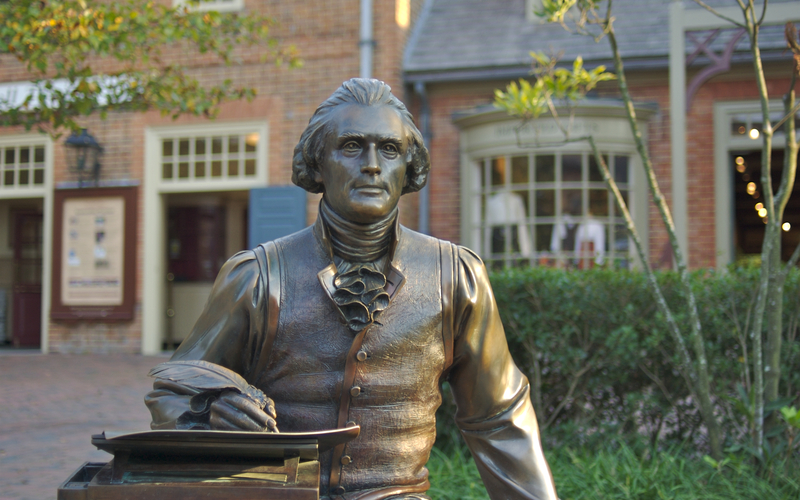The Pursuit of Happiness
Sign up for a six month free
trial of The Stand Magazine!
We are told in society that we need to be affirmed in order to be happy. We are told that when transgenders commit suicide it is because they were not affirmed and accepted in their chosen gender. If that is true, why are there so many celebrity suicides? You would think if what someone needed to be happy was affirmation, celebrities should be at the very top of the happiness charts. However, some of the most successful and well-loved celebrities have committed suicide, and many more suffer from depression.
Case in point: Robin Williams. The world was stunned when beloved actor and comedian Robin Williams committed suicide in 2014. Most people I heard commented while shaking their head: “I never would have guessed he was so depressed.” He portrayed such happy, funny characters such as Mrs. Doubtfire, Patch Adams, and the kooky, but loveable professor in the Disney movie Flubber. Yet behind the smiles and laughter, there was obviously something that was clearly wrong. Why had so much success not brought happiness?
In fact, the fallacy of finding happiness in a self-created identity can be revealed and intensified by the depression and loss of identity suffered by many actors. Consider the life of someone who is constantly living the life of another, of an invented character. At its fledgling beginnings, this would be a prized prospect, a freeing opportunity to reinvent oneself and live vicariously through another in film. Yet, as the roles pile up, so does the loss of real identity. Eventually, actors and celebrities begin to lose themselves struggling with maintaining a grip on reality. Jim Carrey spoke to this phenomenon in a recent interview for Variety Studio. “It was definitely an important moment in the process where I found myself subjugating Jim Carrey for Andy Kaufman and Tony Clifton. And then at the end of it looking for Jim Carrey again and having trouble finding him…” (Variety Studio, 2017).
Anthony Bourdain, whose Facebook page has almost 2 million likes, was one of the most successful food chefs and television personalities in recent memory. He hosted ten different TV shows including, Anthony Bourdain Parts Unknown (2018), No Reservations (2017-2018), A Cook’s Tour (2003-2013) and more. In addition, he produced 7 television shows, was a celebrity judge on 5 additional cooking shows, authored multiple best-selling books and cookbooks, and more. He traveled the world sampling the finest cuisine, experiencing every culture. He seemed to have it all. Yet, his fame and success, too, ended tragically in suicide in 2018.
You might dismiss him as an anomaly, perhaps he suffered from a mental disorder. Certainly, that is how the world would view it. His shocking depression would be explained away as a mental disorder that should have been medicated. If he were the only highly successful person who had committed suicide, perhaps that might be a likely theory. He was wildly successful and yet it brought him no happiness. Why? Rather than wishing he had been prescribed medication, perhaps a look into his philosophies might give us a better understanding as to why he ultimately took his life.
In Kitchen Confidential: Adventures in the Culinary Underbelly (2000), Bourdain said, “Your body is not a temple, it's an amusement park. Enjoy the ride.” That sounds like a philosophy everyone wants to adopt. We would all like to think we can do whatever we want without consequences, that we can live for pleasure and find happiness. Yet, almost contradicting himself in the same book he writes, “I frequently look back at my life, searching for that fork in the road, trying to figure out where, exactly, I went bad and became a thrill-seeking, pleasure-hungry sensualist, always looking to shock, amuse, terrify and manipulate, seeking to fill that empty spot in my soul with something new.” So, he recognized that thrill-seeking sensualism was not filling his soul. But over fifteen years later, what did that philosophy bring him? Did it bring the happiness he believed it would? Did it eventually satisfy his soul? In a 2016 interview with Vogue magazine, Bourdain said, “Life is complicated. It’s filled with nuance. It’s unsatisfying.” He showed the interviewer one of his arm tattoos: “It’s from the Greek [for] skeptics,” he says. “The translation is ‘I am certain of nothing. I’m not even sure I’m certain of that.’ If I believe in anything, it is doubt. The root cause of all life’s problems is looking for a simple [expletive] answer.”
We want so desperately to believe that pursuing our desires, lusts, and passions will bring us fulfillment and satisfy our souls. But the most successful people in history have repeatedly shown that to be a lie. There is such promise of happiness, yet when the goals are achieved which were supposed to bring forth that happiness, there is the agonizing realization that it was a shell game—a rigged one at that. The prize object is not under any of the shells. All of those hopes and dreams are merely an illusion of happiness.
In Trans Life Survivors, Walt Heyer quotes a man who emailed him as saying, “The problem is, as you know, when this disgusting thing consumes your life, you’re not open to hearing the truth. All I saw was the websites, videos, and ‘girls’ in the streets of Bangkok telling me how ‘pretty’ I was going to be. In hindsight, we know how delusional that idea was!” (Heyer, p. 27). What we see in the limelight of television, fame, and fortune can be deceiving. We see what the media wants us to see. We see the air-brushed photos, the big smiles, and the heavily cosmeticized image of one we are told is happy. And when you first embark on a new trajectory in life that you believe will bring freedom and happiness, it will bring you much pleasure and satisfaction for a while.
Yet, much like a drug, it wears off. One day you will look in the mirror and remember the reality of who you are and be confronted with the lie you are living. You will realize, like thousands of transgenders before you, that no amount of cosmetic change will re-create you into something you want to be—no matter how desperately. Robert Arquette, Hollywood actor often called a transgender pioneer, seemed to have all the potential in the world for happiness. He transitioned back and forth several times, never finding satisfaction or fulfillment in who he was. He later admitted that ‘putting on a dress doesn't biologically change anything. Nor does a sex-change.’ [He] said that 'sex-reassignment is physically impossible. All you can do is adopt these superficial characteristics, but the biology will never change.’ That realization, Ibrahim [a close friend] suspects, was the likely source of [his] deep wells of emotional torment.” (https://www.hollywoodreporter.com/news/final-days-alexis-arquette-a-928507).
Robert Arquette had all the support of Hollywood and of the drag scene. Yet, even he recognized that what he so desperately wanted was impossible.
King Solomon was the wealthiest man who ever lived. His wealth so far exceeded the wealth of any other man in history that the gap is staggering. According to wealthresult.com, the second richest man in history was John D. Rockefeller who had a Net Worth of $663.4 billion. King Solomon is estimated to have had a Net Worth of over $2 Trillion! He had 700 wives plus concubines and all the treasures of the earth. The queen of Sheba even sought him out to test his wisdom. And yet even in all his wisdom and all his gain he wrote in the book of Ecclesiastes, “All that my eyes desired I did not refuse them. I did not withhold my heart from any pleasure, for my heart was pleased because of all my labor and this was my reward for all my labor. Thus I considered all my activities which my hands had done and the labor which I had exerted, and behold all was vanity and striving after wind and there was no profit under the sun.”
Happiness is a fleeting myth. It comes and goes like highs from a drug. But there is something much greater than happiness: there is the offer of true joy. It is a joy that is deep within the soul. It is a joy that allows you to rise above all the fear and sadness and travails of life. It satisfies the deep longings of the soul—that void within which money, fame, and self-identity can never bring.
Jesus said in John 16, “Truly, truly, I say to you, that you will weep and lament, but the world will rejoice; you will grieve, but your grief will be turned into joy. Whenever a woman is in labor she has pain, because her hour has come; but when she gives birth to the child, she no longer remembers the anguish because of the joy that a child has been born into the world. Therefore you too have grief now; but I will see you again, and your heart will rejoice, and no one will take your joy away from you.” Jesus knew His disciples would be sad and mourn because He was going to be crucified, dead, and buried. They would believe that all of their hope was lost. But He promised that when He saw them again when He was resurrected from the dead, their heart would rejoice, and no one would take their joy away from them. If you want true joy, true contentment and true, lasting freedom, it is only found in the source of love, truth, and joy: Jesus Christ, the Son of God.
(Editor's Note: This article first appeared HERE on Laura's website)

Sign up for a free six-month trial of
The Stand Magazine!
Sign up for free to receive notable blogs delivered to your email weekly.



















